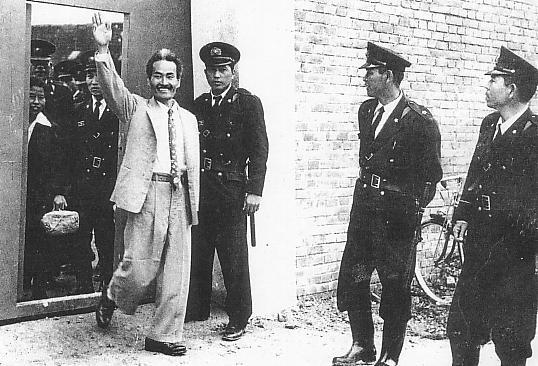Sometimes you hear the argument spread by some Okinawan guy, saying “I don’t like him. He was a politician.” I often wondered what that was supposed to mean. Obviously, it can be very simple black & white thinking. Here’s an example from 70 years ago.
Planning to concentrate on karate and work as a businessman, Nagamine Shōshin ended his police career in 1952. In fact, in the 1953 New Year’s edition of the Ryūkyū Shinpō, Nagamine is mentioned as the “Senior Managing Director” in an advertisement issued by the Okinawa 1st Warehouse.
In 1953, many local governments held extraordinary parliamentary elections due to the increase in population numbers. Naha City’s population also drastically increased and a temporary election was held in March to select a new member for the city council, in which Nagamine was elected. Furthermore, in 1954, when the formal four-year-term election was held, Nagamine was elected as well.
In the second election of 1954, Higa Yuchoku (1910-94) and Nakaima Genkai (1908-84), who were also karateka, also participated in the election and were also elected. Nakaima Genkai was the father of former Okinawa Governor Nakaima Hirokazu (served 2006 to 2014) and was known as a Gōjū-ryū practitioner who had studied under Miyagi Chōjun. At that time, out of the thirty members of the Naha City Council, three were famous karateka. Nagamine became vice-chairman of the city council.
When Nagamine opened his dōjō on January 24, 1954, Naha City mayor Tōma Jūgō attended as a guest and Higa Shūhei, the president of the Ryukyu government, delivered a ceremony address. It seems Nagamine was well established in politics.
In October 1956, when the “Okinawa Karate-dō Renmei” was established, Higa Shūhei, the president of the Ryukyu government, suddenly died of angina. At that time, the president was not yet elected by the public, but was still appointed by the US military. The question, of course, was: who to choose as his successor? As a result, the U.S. military singled out Naha City mayor Tōma Jūgō. By that move, the post of mayor of Naha became vacant, and a new mayoral election was held on December 25. There were two conservative candidates, but Senaga Kamejirō from Tomigusuku won the mayoral election. Senaga was the founder of the Okinawa People’s Party, which later joined the Japanese Communist Party. At that time, Senaga was just released from prison after serving a two-year sentence for sheltering Communists. At that time, the party made a strong political appeal to the residents of Okinawa, saying that it was an unfounded American oppression.
At that time, as a former police man and vice-chairman of the Naha City Council, Nagamine Shōshin inevitably opposed Senaga. Higa Yuchoku and Nakaima Genkai were undecided in the beginning, but eventually also chose the same “anti-Senaga” side. A motion of vote of no confidence was passed by the parliament in June 1957 and the city council elections for the dissolution were held in August. Nagamine lost the election by eight votes, and Nakaima Genkai also lost the election. Higa Yūchoku on the other hand managed to win with a marginal difference.
At that point, Nagamine cut off his ties to politics and never ran for office again. Instead, he returned to karate and business.
© 2023, Andreas Quast. All rights reserved.

